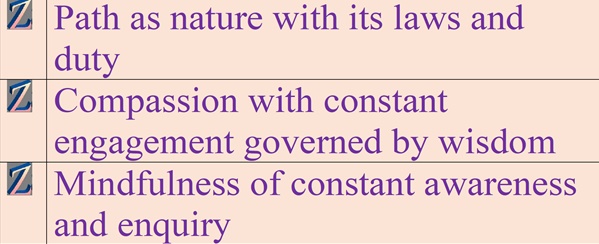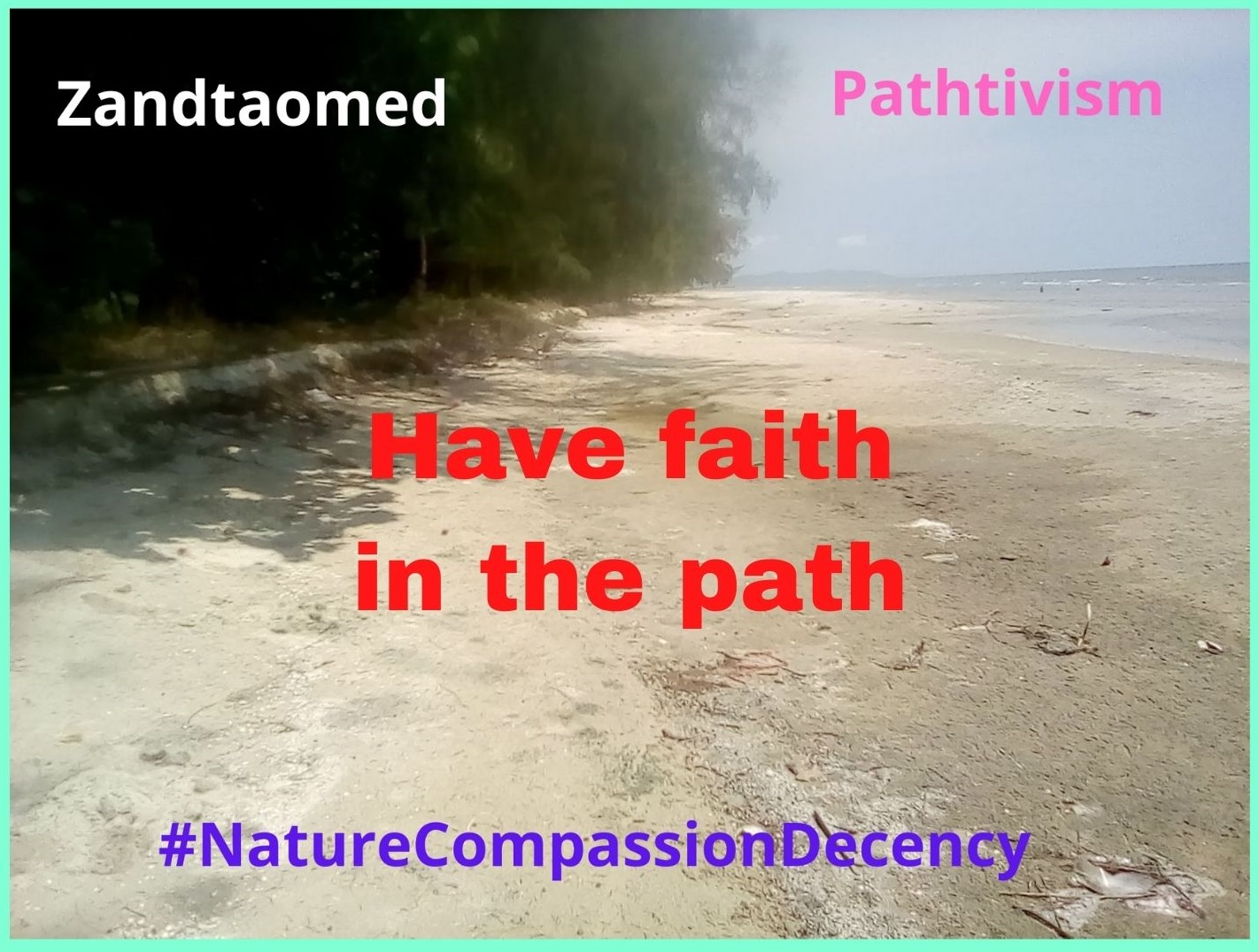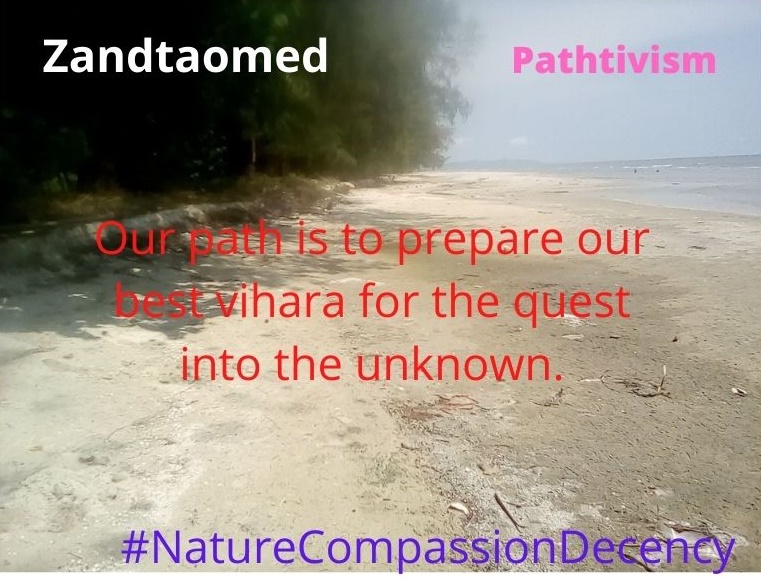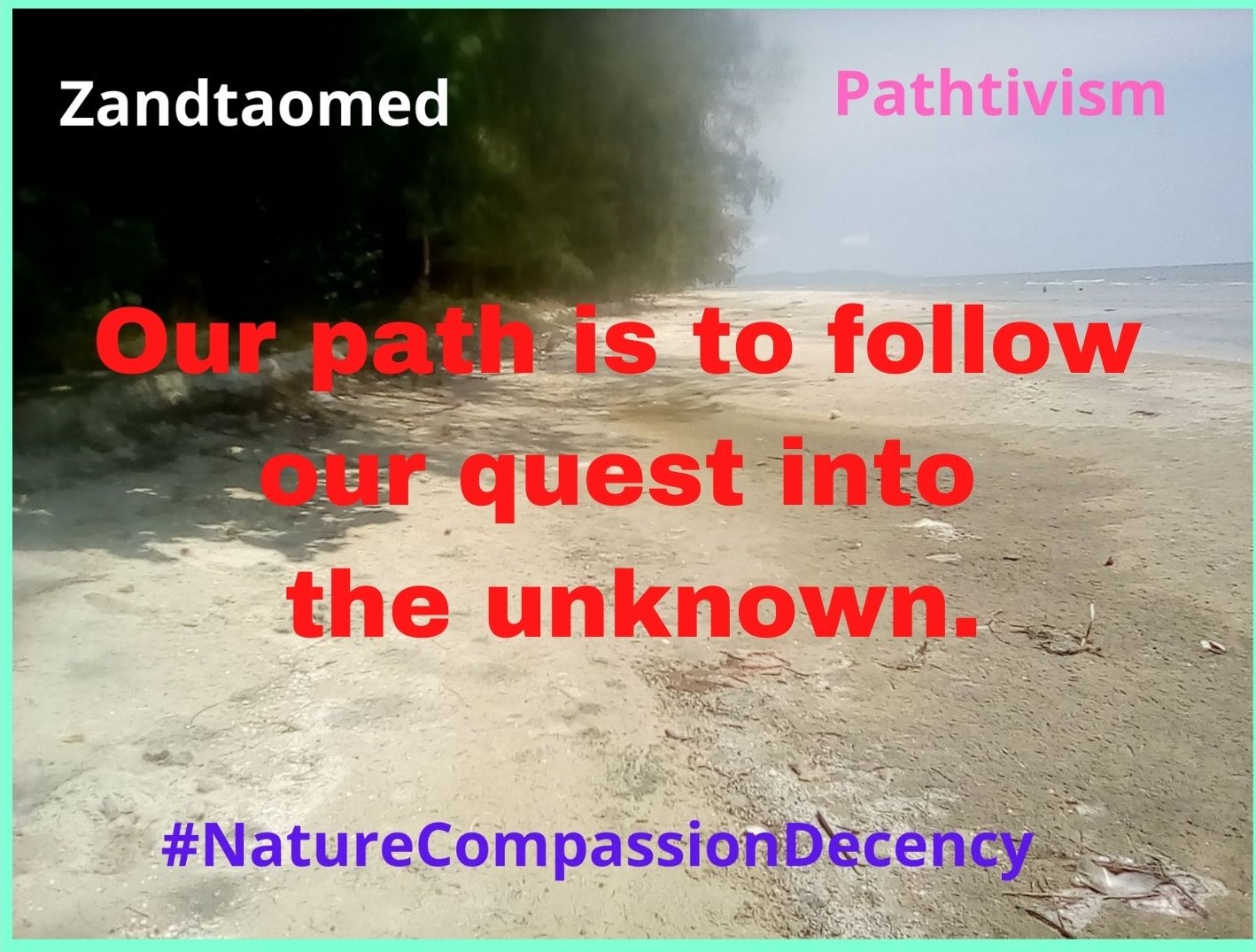|


Reclaiming faith has become central to my practice at the moment, yet it is a word I have previously totally rejected. I don’t feel I am alone in the way I have rejection feelings around faith, and by examining this rejection I hope to show what faith is not – and then why faith is so important to me now.
My childhood religion was Catholic, and I rejected Catholic formality when young - around 11 years of age. At that time, I might well have described myself as following the Catholic faith. My Catholicism came from Catholic grandparents, and as a result of my grandparents' devotion my parents sent me to Catholic primary school and sent me to church on Sundays. I don’t ever recall my parents going to church except with extended family. My younger brother stopped going before me, and I don’t know why I went as long as I did; retrospectively I like to think the reason was my clinging to some form of spirituality but ….
What was this religion to me? I learned certain overt dogmas at school, I attended the masses with less and less interest. My profoundest memory was recognising old women arriving early so that they could get the seats at the back and be seen. If I were to study Esoteric Catholicism now, I might well find similarities to my own path – I came across EC in my time as a theosophist. It is not the understanding that I reject, but those supposedly with faith performing institutional religious duties without any depth of understanding. Who these people are I have no idea; I rejected the falsehood that I observed. Perhaps most importantly there was no identification between being catholic and having sila. My weak memories of the catholic grandparents were of nice people; but even though in confession I was supposedly recalling transgressions to correct, the motions I went through were more concerned with giving the priest something to hear rather than any depth of sila. But I was a child so this cannot really be a criticism of Catholicism.
I was born into a lapsing catholic family, and the catholic faith I had been loosely conditioned into accepting had absolutely nothing to do with the faith in the path I am now promoting. There are good catholic people but the faith I experienced was numbing not empowering. This catholic faith I experienced was concerned with ritual and conformity, it was a faith of belief and practice that had nothing to do with the path that I encourage all to follow. Based on people I have met within institutionalised religion there are many good seekers, but far from promoting genuine quest institutional practice blocks the liberation the path brings.
For institutions faith means the package, the package of beliefs rites and rituals, conformism, and the following of a cleric or dogma without actively engaging the powers of mind. Somehow within these institutions there are people who have found their path, and either they can see nowhere else for them or they are there to attempt to change the institution for the better. Good luck to them. Within the "faith package" they have somehow reached inwards and found the genuine faith that I am asking to be reclaimed, but that genuine faith is not the described package of view, ritual and ceremony.
As an adult I found faith significantly to be in opposition to my socialism, and for many reasons this was difficult to deal with rationally. My politics was based on the emerging compassion that came with my partial awakening - as compassion was the source of my becoming an educationalist. The education came first, and once a teacher I gradually began to realise that education was being restricted by the political system we were in. I set out to be educational, and in ten years had become a political activist – a socialist. Compassion and socialism don’t always fit together but compared with a little more-than-superficial consideration of the capitalist system there was no choice for me. As Zandtaomed I have previously reached out to compassionate conservatives – with no response (in truth few know if Zandtaomed is worthwhile), and now political allegiance in society is just confrontation. I cannot argue that there are times that socialism is not compassionate, but there is no way I can agree with a political and financial system that supports the 1% and destroys the climate. Yet there are many with faith who simply opposed socialism as if socialism was some sort of creed that was against their faith. So their faith was against my compassion, and in my mind that meant faith was not to be trusted. To be fair there is the Marxist saying “religion is the opiate of the masses”, so that is in opposition to those with faith; and amongst the grassroots activists there are many who reject spirituality. However, I saw a way through this because to the spiritual it is religious institutions which provide the opiation and not the spiritual journey itself. But political allegiance is not an absolute thing, and I saw the greed and hatred of capitalism as far worse than anything negative in socialism; to this day I cannot see how genuine Christians can support capitalism. From the conservative Christians I have known, it is fear of change that dominates their thinking so they tacitly support the status quo – significantly their taciturnity includes voting.
Yet the writing of Viveka-Zandtao led to faith, and since then faith has been central to my practice. Two of the four upadanas began to destroy the delusions of these rejected faithful – ditthupadana and silabattupadana. Ditthupadana means clinging to views, and silabattupadana means clinging to rituals and ceremonies. This then leads to the question, what is in faith that is not view, ritual or ceremony? Wisdom or understanding. So is faith clinging to wisdom or understanding?
From this faith developed to a magnetic force; it was the magnetic force of misplaced faith that was clinging to the upadanas, that was clinging to the kilesa and was clinging to the 5 khandhas. But it was also the magnetic force that takes me to wisdom and understanding. It has become part of my MwB to release the attachment to upadanas, kilesa and khandhas, and use the released attachment as faith to reconnect with consciousness developing wisdom and understanding.
And basically this has described the complementary second of vihara. As part of MwB we attempt to perfect the vihara of kaya, vedana, sanna and sankara, and with this perfection there is some kind of transcendence – lokuttara. (In this advice I do not discuss the process of building the vihara much, that is covered in Buddhadasa's Mindfulness with Breathing and anything I have added in the 3rd book of the pathtivism trilogy, the Companion; building the vihara is essentially the recommended method of meditation.)
If there was perfection of the vihara, then there would be transcendence to wisdom and understanding. So this is where faith comes in for me. My vihara is not perfect yet my path takes me into the unknown where faith reconnects me with wisdom – with Unity. Basically faith reclaims attachments from within the vihara and using that faith reconnects with the wisdom of Unity. In meditation I look for attachment and reclaim it as faith for reconnecting with wisdom; it is this meditation practice that is central to my work at the moment.
Let me expand on this a little. Through MwB we follow Buddhadasa’s meditation practice for the 4 foundations of mindfulness. As MwB works through the 4 tetrads of kaya, vedana, citta and Dhamma, the conditioned egos that arise from our upbringing in the home, education and society are released and at the same time our meditation works on not allowing new conditioned egos to arise. My practice is not perfect, and I am conscious that there is conditioning. Yet I still try to follow my path, and have described in the quest of Viveka-Zandtao how there was transcendence within this imperfection. And that transcendence was fuelled by faith, it was the magnetic force that drew me beyond conditioning. This transcendence which can be seen to various extents within various levels of awakening does not require the perfect vihara, and is compensated for by levels of faith. The path is various for different seekers as is transcendence, but there is the MwB methodology of perfecting the vihara combined with faith that can enable moving into the unknown – through transcendence or otherwise.
The magnetic force of faith has only one purpose – helping us follow the path, it is one of the tools nature has given us for reconnection – faith and meditation. That purpose is hijacked by conditioning. From birth we follow our instincts that enable us to survive to adulthood; but in that surviving process we attach to egos from the home – and sadly in many cases trauma, and we attach to egos from our education and contact with society. We enter adulthood with an egoic burden which hopefully through maturity we release and begin to follow our paths. Throughout that time faith is unconsciously there pulling us to our paths, and as we release our attachments (kilesa, upadana and khandhas) to the vihara our faith in the path increases as our wisdom develops, and we know that the path is what nature meant for us. Building faith could be a way of describing following the path. But this is building a faith that does not require view (as belief), ritual or ceremony, “simply” releasing attachments.
Recognising the nature of faith and its relationship to following the path and the vihara has given me clarity. With a focus on faith study has become more sampajanna; as I study the knowledge leads to the release of attachment, the resulting increase in faith then leads to following the path. As I overcome my ignorance I recognise more-and-more attavadupadana, and seeing and releasing this attachment can develop faith for following the path. There is a more immediate connection between the wisdom and the practice – sampajanna – through faith.
If you cannot separate faith from view (as belief), ritual and ceremony, then there is clinging so embracing faith in the way I suggest is not beneficial. But if you are not encumbered with these upadanas, then understanding the relationship between vihara and faith is beneficial. And this can lead to greater sampajanna when your study yields faith and more purpose in following the path.
There is a faith vacuum in society.

On an individual level genuine faith, faith in the path or faith in the true self, has been dissipated through conditioning, if we examine this dissipation we can begin to see the nature of faith and start to reclaim it. We can begin with cults because this gives us the closest understanding of the faith vacuum. People especially young people grow up and they have a sense of seeking, a sense of the path, and become attracted to a cult because of the vacuum in society. They give faith to the cult practices, and their conviction cannot be assuaged. This is the genuine nature of faith, complete dedication and conviction that the path must be followed. Because in adult society there is nowhere for this path to be found, the faith is mistakenly placed in the cult. Society sees the immorality that can exist in many cults, and does not question the gaping faith vacuum that exists. If the faith vacuum were recognised then education could prepare for it with a basis of #NatureCompassionDecency as the core of a curriculum, but such a core would also educate against the greed and hatred that is promoted in our defiled world.
But what examining seekers connecting to cults teaches us is that faith is completely dedicated and a totally committed conviction. But that faith becomes misplaced because we grow up in a faith vacuum. A faith that clings to ditthupadana and silabattupadana, views as beliefs, rites and rituals, such a misplaced faith does not fill the faith vacuum. Misplaced faith attaches to the beliefs that build up the clinging to belief (ditthi) exhibited by many institutional religions. This attraction adds to the ego of ditthupadana, and not the path that has no clinging. Faith in the path promotes sampajanna, ditthupadana promotes adherence to institutionalism and institutionalism is not always right action. Following our paths awakens our hearts and we begin to return to the spiritual love that we were at conception. Institutionalism means that we cling to the institution whose beliefs we adhere to. In the end this is not Unity because institutions are divided. Significant in following the path is the tolerance that accepts the truth in all dogmas; it is not the dogma that matters even if it is Buddhism, it is the truth behind the dogma that we have faith in – faith in the path. When such a misplaced faith does not attract to a true path, the young seeker feels the vacuum, and turns to alternatives that includes the cults already mentioned.
But this committed conviction aspect of faith can also be seen amongst those who having turned away from misplaced faith in established institutional religions also reject other aspects of mainstream conditioning. This conviction appears to be a characteristic of white supremacists, but I don’t know or meet them. It is definitely a characteristic of committed socialists – as opposed to the liberal or armchair variety (within the mainstream) – for the short time before their activism burns them out. This faith drives socialists on ignoring the fallacies of their position, that the 99% will never be united because there will always be people who can be bought off, that the 1% will never allow an electoral system that would take away their power, that they can never defeat the propaganda of a 1%-media that promotes wage-slavery, wars-for-profit, escapism and so much more that is part of the defiled world.
If there were no faith vacuum people would use their faith to follow their paths. Having faith in the path means being completely dedicated to the path, but from birth that faith is dissipated by conditioning. Nature conditions us for survival by giving us instincts, when young following those instincts keeps us safe. This is how our faith is used when young – this is nature’s path. But because of the defiled world this conditioning is clung on to as a matter of conformity; rather than letting go of the conditioning as a mature adult the defiled world conforms us into living adult life as conditioned egos.It is this process of conditioning that dissipates faith. From conception our nature, spiritual love, becomes love for mothers, and then fathers, by the time we are born that love has been conditioned. We love our mothers – parents, and accept their protection. This protection leads to accepting their upbringing and then the education they choose for us etc. How do we accept what is taught? An aspect of faith. Ideas are presented, we love our parents so we desire the ideas they present to us, we attach to those ideas, they become our ideas, we attach to desired characteristics that become our egos, and we grow up conditioned in this way. Conditioned by faith as attachment, conditioned by faith as clinging.
Here come the Buddhist lists. We attach to the kilesa of greed, hatred and delusion. We cling to the upadanas of desire, ideas, ritual and self. We attach to the khandhas of kaya – body, vedana – feelings, sanna – memories and perceptions, sankhara – mental operations as proliferations instead of letting go after the experience. In one way or another faith as attachment or upadana uses its magnetic force to create the egos that make up our conditioned selves and egos.
And it is this faith as tanha and upadana that we need to reclaim to follow our paths. The more faith that we reclaim the greater our dedication to the path, the more we follow it. As we follow our paths our hearts awaken and we begin to return to the spiritual love that we were at conception.
|





 Zandtao Meditation page
Zandtao Meditation page
 Advice from Zandtaomed
Advice from Zandtaomed

